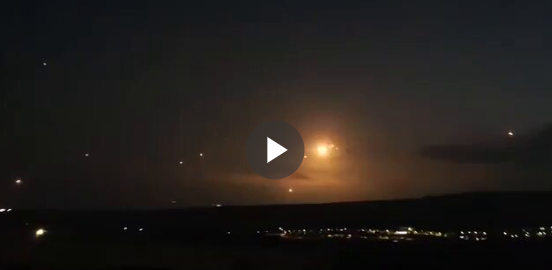Today, Hezbollah, a militant group based in Lebanon and backed by Iran, and Israel both announced large-scale military operations against each other. Hezbollah reported that it had launched “more than 320” Katyusha rockets targeting strategic Israeli military sites. This marks a significant escalation in the ongoing conflict between the two parties.
The Israeli Air Force in a wave of attacks in southern Lebanon.
Pray for Israel and the IDF. 🙏🇮🇱 pic.twitter.com/TzmqamGtTe
— Eli Afriat 🇮🇱🎗 (@EliAfriatISR) August 25, 2024
In response, the Israeli military launched preemptive strikes on Hezbollah targets in Lebanon early Sunday. The Israel Defense Forces (IDF) stated that they had identified preparations by Hezbollah for “large-scale” attacks on Israeli territory. To counter these threats, the Israeli Air Force (IAF) deployed fighter jets to strike Hezbollah positions that posed an immediate risk to Israeli civilians.
According to an Israeli military statement, “Approximately 100 IAF fighter jets… struck and destroyed thousands of Hezbollah rocket launcher barrels that were located and embedded in southern Lebanon.” The statement highlighted that most of these launchers were aimed at northern Israel, with some targeting central regions.
This military confrontation comes after weeks of mounting tension following the assassination of Hezbollah’s military commander, Fuad Shukr, last month. Both Hezbollah and its regional ally, Iran, had vowed retaliation, labeling the attack on Shukr as a direct provocation and an act of war.
Hezbollah described its current military actions as an “initial response” to Shukr’s killing, stating that it launched a large-scale air attack with numerous drones deep into Israeli territory. The group also targeted several enemy positions, including barracks and Iron Dome missile defense systems, with a significant number of rockets. Hezbollah indicated that these military operations would continue for some time.
In response to the escalating situation, Israeli Prime Minister Benjamin Netanyahu convened a security cabinet meeting early today. Following the meeting, Israeli Defense Minister Yoav Gallant declared a state of emergency across the country for the next 48 hours. This “special situation on the home front” allows the IDF Home Front Command to enforce various restrictions on civilians to ensure their safety.
🛑BREAKING: In a self-defense act to remove Hezbollah’s threat, the IDF is striking targets in south Lebanon, from which the Iranian-backed Lebanese terror organization was planning to launch their attacks on Israeli civilians.
Hezbollah rocket and drone attacks are targeting… pic.twitter.com/BtuUAqtgsv
— Israel ישראל (@Israel) August 25, 2024
The IDF confirmed in a statement, “The Israeli Defense Force identified the Hezbollah terrorist organization preparing to fire missiles and rockets toward Israeli territory. In response to these threats, the IDF is striking terror targets in Lebanon.” The statement further detailed that IAF fighter jets are actively engaging targets belonging to Hezbollah that pose imminent threats to Israeli citizens.
As a precaution, Ben Gurion International Airport in Israel announced delays and diversions of flights early Sunday, while emergency services have heightened their preparedness for potential large-scale attacks from Hezbollah.
The United States has voiced its support for Israel amidst the rising tensions. A U.S. National Security Council spokesperson, Sean Savett, stated, “At President Joe Biden’s direction, senior U.S. officials have been communicating continuously with their Israeli counterparts. We will keep supporting Israel’s right to defend itself, and we will keep working for regional stability.”
The ongoing conflict between Israel and Hezbollah has led to frequent exchanges of fire across the Israel-Lebanon border since the outbreak of the Gaza war in October. This recent escalation has raised concerns about the potential for a broader conflict in the region.
Northern Israel moments ago; Hezbollah has fired over 320 rockets and UAVs.
It claims “the first part of our revenge is over”.
Pray for Israel’s victory. pic.twitter.com/gqxaojy1Yl
— Hananya Naftali (@HananyaNaftali) August 25, 2024
These hostilities trace back to increased tensions following Hamas’s unprecedented attack on southern Israel on October 7 of last year, which resulted in nearly 1,200 deaths, primarily civilians. In retaliation, Israel’s military campaign in Gaza has led to over 40,000 Palestinian deaths, according to the Gaza health ministry. The situation remains highly volatile, with both sides preparing for further confrontations.
Major Points:
- Hezbollah launched over 320 Katyusha rockets at Israeli military sites, while Israel conducted preemptive airstrikes targeting Hezbollah positions in Lebanon in response to perceived threats.
- This escalation follows weeks of heightened tension after the assassination of Hezbollah’s military commander Fuad Shukr, with both Hezbollah and Iran vowing retaliation.
- In response to the attacks, Israeli Defense Minister Yoav Gallant declared a 48-hour state of emergency, allowing the military to impose civilian restrictions and heighten security measures.
- Ben Gurion International Airport in Israel announced flight delays and diversions, while emergency services increased their preparedness for potential large-scale attacks.
- The United States reiterated its support for Israel’s right to defend itself, with ongoing communications between U.S. and Israeli officials to maintain regional stability amid the escalating conflict.
Lap Fu Ip – Reprinted with permission of Whatfinger News



